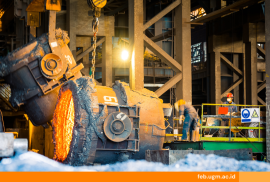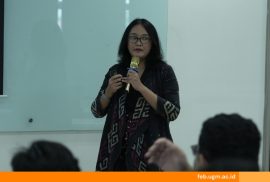Looking at the polemic that occur in the community related to the Regulation Draft of Cipta Karya (Omnibus Law), on Friday (6/3), Department of Economics, Faculty of Economics and Business Universitas Gadjah Mada (FEB UGM) held a Seminar and Public Lecture (SinarKU) with the theme “Omnibus Law: When the Institutional Aspect Is Forgotten”. The public lecture was held at the Djarum Foundation Auditorium and was attended by FEB UGM students, as well as the speaker Prof. Dr. Maria S.W. Sumardjono as academics from the Faculty of Law UGM (FH UGM) and Dr. Rimawan Pradiptyo, as academics from Faculty of Economics UGM (FEB UGM).
Dr. Rimawan criticize the academic script from Regulation Draft of Cipta Kerja (Omnibus Law). According to him, the academic paper should look broadly and become a good predictor related to the contents of the act itself. The research questions in the academic paper were less relevant and did not reflect the problems of the Indonesian economy and how they were resolved..
“Our challenge in development is we don’t know ourselves and our opponents, we too often dwell on the informal sector, even though it is time for the informal sector to transform into formal, and the formal sector also has the support of the institution,” said Rimawan.
In the economic aspect, according to him there is no harm in carrying out legal innovations but please understand the aspects of limitations in humans. It should be broken down again, maybe the omnibus law for health, or the omnibus for education, is more limited so that later laws can be better understood by all parties. Legal risks should also be considered in this Cipta Karya Bill.
{source}<iframe width=”560″ height=”315″ src=”https://www.youtube.com/embed/7OejAXAUchE” frameborder=”0″ allow=”accelerometer; autoplay; encrypted-media; gyroscope; picture-in-picture” allowfullscreen></iframe>{/source}
In the other hand, Prof. Dr. Maria S.W. Sumardjono focus on land sector regulation in the Cipta Karya Bill. Maria said that the Employment Copyright Law raises problems in terms of theoretical and potential implementation. Particularly in relation to the land sector, the substance that is regulated needs to be reconsidered, so as not to revive crucial issues that are rejected in the Land Bill, which will then be “bring” back through the Cipta Karya Bill.
In addition there are also problems from the bureaucracy side. Based on the 2019 RI Ombudsman report, public complaints in the land sector remain at the top. According to him, this is caused by services that should be open.
“What is happening now is a convoluted bureaucracy. In fact, an effective bureaucracy is prioritizing results. Make efficiency requirements, mechanisms, financing, and completion time, “said Maria.
Investments supported according to him are investments that are fair, democratic, legal certainty, and sustainable, one of them by paying attention to the urgency of harmonizing the Law in the field of Natural Resources (Sectoral Law), because investment requires the availability of land, be it investment in development, tourism, mining, transportation, plantations, or products.
Maria asserted, if not pursued together with the harmonization of sectoral laws, encouraging increased investment by simplifying regulations and permits would be the same as increasing the potential for conflict and injustice in access to the control and use of natural resources for groups outside the corporation. It also will add potential to excessive exploration of natural resources and exacerbate environmental damage.
To resolve this problem, Maria suggested to the Government to continue implementing the Agrarian Reform (RA) Programs in earnest, encourage the issuance of a bill related to the Rights of the Customary Law Community (MHA), and solve various agrarian conflicts that have taken place since the Orde Baru Era and have never been successfully resolved completely, efforts need to be sought through the establishment of an independent Institute for agrarian conflict resolution which is directly responsible to the President.
Source: Sony Budiarso/Leila Chanifah Z.




